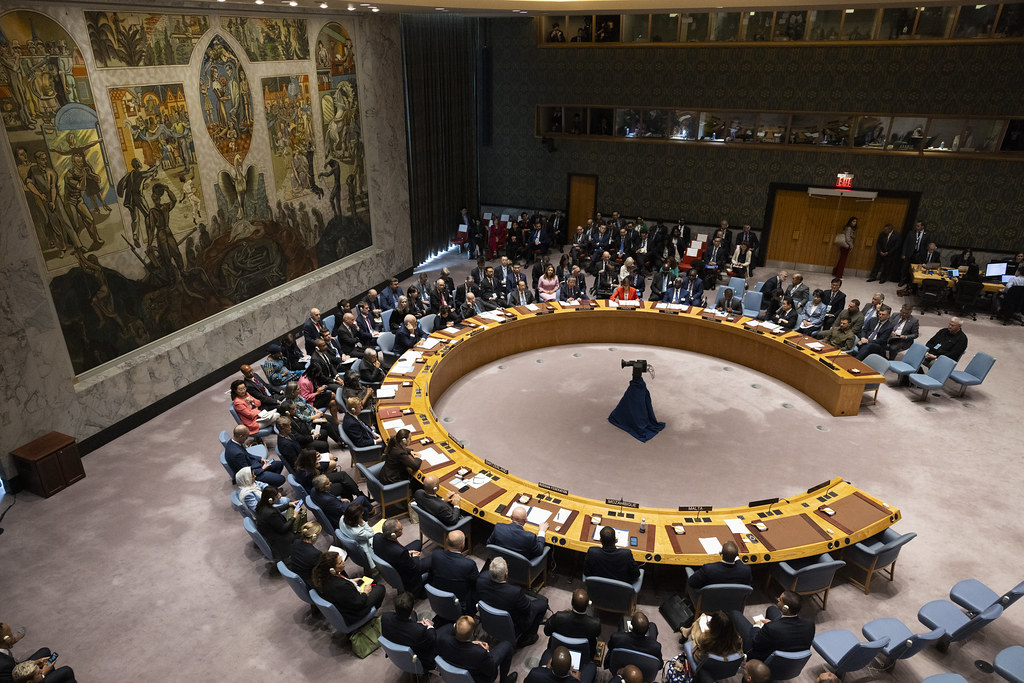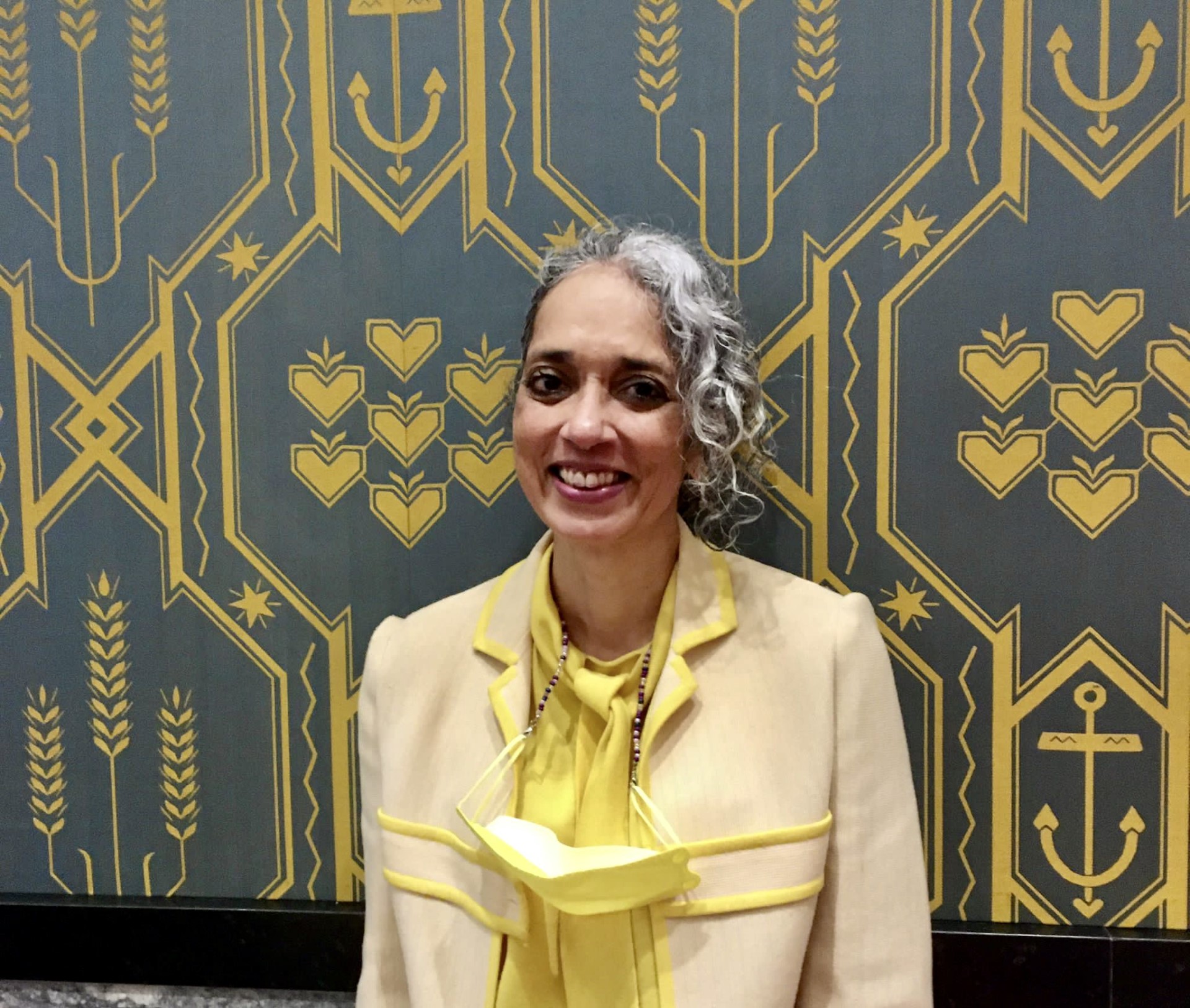The United Nations Security Council in 2023

Editor’s Note: This piece was adapted from the Security Council Report’s January 2024 Monthly Forecast.
In 2023, the United Nations Security Council was severely tested by a multilateral environment in turmoil. It faced the continuing effects of the Russian invasion of Ukraine, the precipitous escalation of conflict in the Middle East, and pushback against UN peacekeeping in Africa as well as UN sanctions. The shifting global balance of power, the contrasting narratives about global priorities that emerged after the invasion of Ukraine, and the allegations of Western double standards over Israel’s actions in Gaza have severely strained relations and deepened the atmosphere of distrust among members of the council. What’s more, the council faced continued public criticism for its inability to address alleged violations of the UN Charter.
The Ukraine conflict remained a fixture on the council’s program of work, although there has been less appetite for trying to forge agreement on Council decisions, given the difficult council dynamics—including tensions between Russia and Western council members. What’s more, the escalation of the conflict between Israel and Hamas in October became a central preoccupation for members in the last quarter of the year. Elected members led the way in trying to find agreement on council action—for example, Malta authored a resolution in November 2023 calling for urgent and extended humanitarian pauses and corridors throughout the Gaza Strip—but they were often stymied by the entrenched position of the United States, a veto-wielding permanent member.
The council also grappled with sudden terminations of key UN peace and security mechanisms in conflict situations. Host governments abruptly dismissed two peace operations, in Mali and Sudan, which were then brought to an end by the Security Council and were drawn down rapidly. The Mali sanctions regime was ended by a Russian veto, while another Russian veto shuttered the cross-border mechanism that was established in 2014 to ensure the delivery of aid into and within Syria.
At the same time, the council was confronted with multidimensional crises in a number of long-standing situations on its agenda, including the Central African Republic, the Democratic Republic of the Congo, Haiti, Myanmar, Somalia, and Sudan. It also addressed regular missile launches by the Democratic People’s Republic of Korea (DPRK) and the flare-up between Armenia and Azerbaijan. Its level of engagement in these situations varied. For example, although the situation in Myanmar deteriorated rapidly in 2023, the council met rarely to address the issue: once in a private meeting, as required by the resolution adopted in December 2022, and two other times in consultations and under “any other business.” However, as the situation in Sudan deteriorated, the council met an additional seven times, outside the regular four annual meetings.
Through the women, peace, and security presidencies initiative—started in late 2021—Kenya, Ireland, and Mexico made this issue a priority of their monthly council presidencies. Most council members in 2023—Albania, Brazil, Ecuador, France, Gabon, Japan, Malta, Switzerland, the United Arab Emirates (UAE), the United Kingdom, and the United States—committed to making women, peace, and security a priority issue during their monthly presidencies. Engagement on the commitments was uneven, however. The intimidation of and reprisals against a women civil society representative who briefed at a January 2023 council meeting on Mali had a chilling effect on invitations to women civil society briefers during the rest of the year.
Plenty of Talk, Less Action
In 2023, the council chamber continued to be the battleground for opposing narratives of the global order, as members sought to amplify their own worldviews. The council held 288 formal meetings and 124 informal consultations, compared to 292 and 127, respectively, in 2022. As it had the year before, Ukraine dominated the council’s agenda, with 39 formal meetings, one meeting in closed consultations, and two discussions in consultations under “any other business.” Following the escalation of the conflict in Gaza, the council held 14 meetings between October and the end of December on “the situation in the Middle East, including the Palestinian question,” in addition to the regular monthly meetings on the issue.
Overall, the council is spending more time in meetings. In 2022, meeting time increased by more than 100 hours compared to 2021, to 650 hours, largely due to the Ukraine crisis. In 2023, the council spent more than 690 hours‚ or some 6 percent longer, in meetings, compared to 2022. Besides the added time spent on urgent crisis situations, members tended to provide longer explanations before and after their votes. Meetings have also been prolonged by procedural disputes at their outset.
In spite of the difficult dynamics in the council, the number of resolutions remained steady in the years prior to 2023. The council adopted 54 resolutions in 2022 as compared to 57 in both 2021 and 2020. In 2023, the council adopted only 50—the second lowest number of resolutions in a decade. A slightly higher percentage of resolutions was adopted unanimously in 2023 (70 percent) as compared to 2022 (67 percent). While the level of unanimity is still low compared to the first two decades of the post-Cold War period, members continued to make significant efforts to come to agreements, albeit not always successfully despite protracted negotiations in which penholders were often open to incorporating suggestions. In some cases, improved relations between the penholder (the country drafting and leading the negotiations on the resolution) and the host government (the government of the country to which the resolution pertains) may also have allowed for less disagreement on resolutions. For example, the resolution initiating the drawdown operations of the UN Organization Stabilization Mission in the Democratic Republic of the Congo (MONUSCO) was adopted unanimously in December 2023 following improved relations between France and the DRC government.
There was a higher number of vetoes and failed resolutions due to insufficient votes in 2023 compared to the year before, with an especially striking increase in the latter. Six vetoes were cast on five resolutions, three by Russia, two by the United States, and one by China. The United States also vetoed an amendment by Russia on a draft Gaza resolution. The vetoes were cast on a mix of issues: humanitarian aid to Syria (a draft vetoed by Russia in July), Mali sanctions (a draft vetoed by Russia in August), and the war between Israel and Hamas (three vetoed draft resolutions, one by the United States in October, a second by China and Russia in October, and a third by the United States in December). On Nov. 15, 2023, the council managed to adopt a resolution initiated by Malta on humanitarian pauses in Gaza with a particular focus on children. Following intensive negotiations, it adopted a second Gaza resolution initiated by the UAE on Dec. 22, 2023, which requested that the secretary-general appoint a senior humanitarian and reconstruction coordinator, and that the coordinator establish a UN mechanism for accelerating humanitarian relief consignments to Gaza. (The vetoes on Gaza in October 2023 prompted the resumption of the General Assembly’s 10th Emergency Special Session on the Middle East and two General Assembly resolutions.) On seven occasions, draft resolutions or amendments were not adopted due to insufficient votes. They included Russian drafts on the attack on the Nord Stream pipeline, humanitarian aid to Syria, Mali sanctions, and two on the Gaza situation. Two amendments by Russia on a draft resolution on the Gaza situation were also not adopted due to insufficient votes—marking the first time since 1961 that seven or more council resolutions failed due to insufficient votes.
The difficulty in obtaining consensus is also illustrated by the low number of presidential statements, which are formal council decisions that are like resolutions but generally have less political clout and require unanimity to be adopted. The seven presidential statements in 2022, the lowest number since 1994 when the council began publishing presidential statements under the current prefix. i, were followed by just six presidential statements in 2023. The six statements in 2023 addressed transnational crime, hunger and security, Libya, the Middle East—including the “Question of Palestine”—and the DRC, on which there were two such statements. This historically low number reflects the difficulty in achieving consensus, which is required for the adoption of presidential statements.
The Politicization of Working Methods
The pronounced procedural wrangling that followed Russia’s invasion of Ukraine continued into 2023. For the first time since February 2019, council members were unable to reach an agreement on the provisional program of work for the months of August and September, when the U.S. and Albania held the council presidencies. Russia blocked these adoptions because Ukraine featured in the programs. (Ukraine meetings generally are requested during the month by members rather than included in the program of work at the start of the month.) Instead, a daily plan of work was circulated and published on the presidency’s website.
Invitations extended to briefers and member states were also affected by this dynamic, in the form of three procedural votes held to determine briefers or member state participation in meetings. In March 2023, a procedural vote was held on inviting Daria Morozova, commissioner of human rights of the self-declared Donetsk People’s Republic, whom Russia had proposed under Rule 39 of the UN Charter as a briefer for a meeting on Ukraine. The council ultimately voted against Morozova’s participation in the meeting. In July 2023, a procedural vote was held after Russia objected to Ukraine’s participation in a meeting on Iran and nonproliferation. The council voted to allow Ukraine’s participation at that meeting. Also in July, a procedural vote was held to determine if a civil society briefer suggested by Russia would be able to brief. In this case, the individual was not permitted to brief because of insufficient votes. Another procedural battleground in 2023 was the webcasting of Arria-formula meetings on the official UN channel. Arria-formula meetings are informal sessions that allow members to raise awareness of (sometimes controversial) issues and hear from briefers that may not be able to easily brief in other meeting formats. Eight Arria-formula meetings between March and July were not broadcast to the public due to objections from council members. Although this is an informal format, through practice over time, the council has established that if a single council member objects, the webcasting of Arria-formula meetings can be blocked.
In 2023, the topics chosen for Arria-formula meetings reflected the impact of the Ukraine conflict on the council’s activities. Of the year’s 22 Arria-formula meetings, eight were related to Ukraine, including all six convened by Russia. Members used these meetings to promote competing narratives on various aspects of the Ukraine conflict, including on accountability, the freedom of religion, and children. For instance, following Russia’s April 5, 2023, Arria-formula meeting on “Children and Armed Conflict: Ukrainian Crisis. Evacuating Children from Conflict Zone,” Albania, France, and the United States, together with non-council member Ukraine, convened an Arria-formula meeting later that month on the abduction and deportation of children during armed conflict, with a specific focus on Ukrainian children. Other issues covered in Arria-formula meetings in 2023 included women, peace, and security; protection of civilians; and climate and security. The only two country-specific situations covered were the human rights situation in the DPRK and Myanmar.
In a positive development, the P3 penholders (France, the United States, and the United Kingdom) continued to be more open to sharing the “pen” with elected members. In 2023, Ecuador was a co-penholder with the United States on Haiti, and with France on humanitarian issues in Ukraine, In addition, Albania was a co-penholder with the United States on political issues arising from the crisis in Ukraine, and the the UAE briefly assumed the co-penholder role with France on Mali sanctions prior to the dissolution of the sanctions regime. Elected member co-penholderships were maintained, with Japan and the UAE leading on Afghanistan, Switzerland and Brazil on humanitarian operations in Syria, and Ghana and Switzerland on the UN Office for West Africa and the Sahel ( UNOWAS).
A presidential note on penholders was agreed in December 2023 and sets out general guidelines for penholding. Among other things, it states that any council member should have the opportunity to serve as a penholder or co-penholder and can add value in this regard, while calling on members holding the pen to “conduct negotiations in an inclusive and respectful manner.”
Pushback Against the Use of Robust Tools
In 2023, UN peace operations came under great stress. MINUSMA, the peacekeeping mission in Mali, was terminated, and the drawdown of MONUSCO in the DRC was set in motion. The special political mission in Sudan, UNITAMS, was closed as well. The secretary-general appointed a personal envoy on Sudan, and the council will hear periodic reporting on the country. Additionally, expanded coverage of Mali can be expected via UNOWAS reports.
These developments may prompt members to reflect seriously on the future of peace operations ahead of the Summit of the Future in September 2024. In the New Agenda for Peace released in July 2023, the secretary-general suggested that members need to consider alternative mission models that are more “nimble, adaptable and effective.”
In this context, the role of regional organizations in addressing conflict situations in their area is expected to be a greater focus in 2024. The resolution on the financing of African Union-led peace support operations authored by the A3 (that is, the three African members of the council) and adopted in December 2023 may emerge as a way forward for future peace support partnerships between regional organizations and the United Nations.
The end of the Mali sanctions regime in August 2023 capped a growing unease among some members with UN sanctions, or sanctions mechanisms—notably the panels of experts and their independent, detailed reporting. The year 2023 highlighted stark differences between members over the effectiveness of sanctions and when conditions on the ground merit their easing. In March 2023, the council introduced a potential “sunset clause” for the future of the Darfur sanctions regime, on which it would decide within 18 months, by September 2024. After renewing the South Sudan sanctions regime in May, the council decided that the South Sudanese authorities no longer needed to notify the sanctions committee of the supply, sale, or transfer of nonlethal military equipment in support of the implementation of the peace agreement. And in July 2023, when it extended the Central African Republic (CAR) sanctions regime, the council lifted the arms embargo on the CAR security forces.
In 2023, panels of experts came under greater scrutiny and criticism. Russia placed a six-month hold on appointments to the CAR Sanctions Committee in August 2023, which barred the committee from functioning. The Russian veto on the extension of Mali sanctions appears to have been connected to Russia’s unhappiness with reporting by its panel of experts.
The Year Ahead
New members Algeria, Guyana, Sierra Leone, Slovenia, and the Republic of Korea have joined the council at a critical time. The two major international crisis situations of 2023—the situation in Ukraine, and the Israel-Hamas war—have continued into 2024. If peaceful solutions are found, there may be opportunities for greater UN engagement, including by the Security Council. Robust discussions around the future of peacekeeping and the role of regional organizations are urgently needed. As missions draw down in the DRC and Sudan, and following the closure of the Mali mission, council members will be keeping a watchful eye on the transition processes. Elections in fragile settings such as South Sudan also bear watching, as do continuing humanitarian crises in many other situations on the council’s agenda. Complicated negotiations on sanctions are likely and may lead to further adjustments to current sanctions regimes, including in CAR and Darfur.
The council has failed to fully utilize the tools at its disposal in dealing with the interlocking threats facing the world today. To remain relevant in the emerging global order, the council will need to take more determined steps to reach out to other member-state bodies, while reflecting on its own unwillingness, or incapacity, to draw on a range of possibilities for action found within the UN Charter, most notably its tools under Chapter VII for responding to threats to the peace, breaches of the peace, and acts of aggression.



.jpg?sfvrsn=d27bd863_5)

